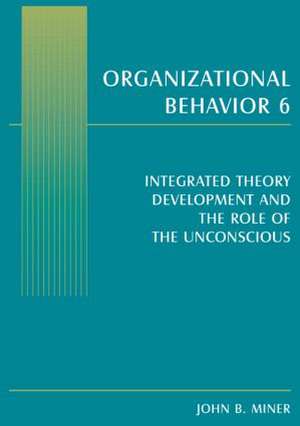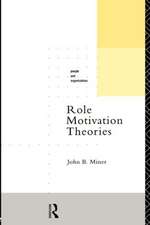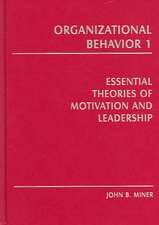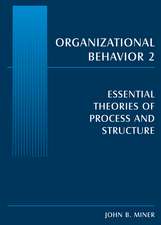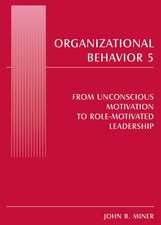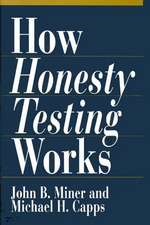Organizational Behavior 6: Integrated Theory Development and the Role of the Unconscious
Autor John B. Mineren Limba Engleză Hardback – 15 iun 2011
Part I covers the foundations of the scientific method, theory development, and the accrual of scientific knowledge in the field. Part II introduces the ideas of pioneers whose work pre-dates the emergence of Organizational Behavior. Part III considers the actual emergence of OB as we know it today, with an analysis of the environmental forces that impinged upon it (such as the recruiting of social scientists into business schools). Part IV presents an assessment of the current state of the art in OB research, with an original assessment of the importance, validity, and practical usefulness of 73 core theories in OB. Finally, Part V sets forth a vision for the future identity and growth of Organizational Behavior research, theory, and practice.
| Toate formatele și edițiile | Preț | Express |
|---|---|---|
| Paperback (1) | 328.81 lei 6-8 săpt. | |
| Taylor & Francis – 15 oct 2011 | 328.81 lei 6-8 săpt. | |
| Hardback (1) | 764.20 lei 6-8 săpt. | |
| Taylor & Francis – 15 iun 2011 | 764.20 lei 6-8 săpt. |
Preț: 764.20 lei
Preț vechi: 1102.79 lei
-31% Nou
Puncte Express: 1146
Preț estimativ în valută:
146.25€ • 152.12$ • 120.74£
146.25€ • 152.12$ • 120.74£
Carte tipărită la comandă
Livrare economică 15-29 aprilie
Preluare comenzi: 021 569.72.76
Specificații
ISBN-13: 9780765619921
ISBN-10: 076561992X
Pagini: 367
Dimensiuni: 174 x 246 x 34 mm
Greutate: 0.45 kg
Ediția:1
Editura: Taylor & Francis
Colecția Routledge
Locul publicării:Oxford, United Kingdom
ISBN-10: 076561992X
Pagini: 367
Dimensiuni: 174 x 246 x 34 mm
Greutate: 0.45 kg
Ediția:1
Editura: Taylor & Francis
Colecția Routledge
Locul publicării:Oxford, United Kingdom
Cuprins
I: Theories of Motivation; 1: Expectancy Theories; 2: Goal-Setting Theory; 3: Kurt Lewin's Social Psychology; 4: Achievement Motivation Theory; 5: Job Characteristics Theory; 6: Theories Based on B. F. Skinner and Organizational Behavior Modification; 7: Equity Theory and Distributive Justice; 8: Attribution Theory as Applied to Managerial Perceptions; 9: Existence, Relatedness, and Growth Theory; 10: Psychoanalytic Theory as Applied to Organizations; 11: Self-Determination Theory; 12: Theory of Behavior in Organizations; II: Theories of Leadership; 13: Normative Decision Process Theory; 14: Leader-Member Exchange Theory; 15: Information Processing Theory of Leadership; 16: Role Motivation Theory of Leadership; 17: Charismatic Leadership Theory; 18: Contingency Theory of Leadership; 19: Substitutes for Leadership Theory; 20: Path-Goal Theory; 21: The Romance of Leadership; III: Organizational Decision Making; 22: Administrative Behavior and Organizations; 23: Image Theory; 24: Behavioral Theory of the Firm, Organizational Learning, and the Garbage Can Model: Theories Involving James March; IV: Systems Concepts of Organizations; 25: Control Theory (Using the Control Graph); 26: Katz and Kahn's Social Psychology of Organizations; 27: Sociotechnical Systems Theory; 28: Sociological Open Systems Theory; 29: Contingency Theory of Organizations: Differentiation and Integration; 30: Ralph Stogdill's Group-Focused Systems Theory; V: Bureaucracy-Related Concepts; 31: Weber's Theory of Bureaucracy; 32: The Theory Undergirding the Aston Studies; 33: Peter Blau's Theory of Differentiation; 34: Goal Congruence Theory and Organization Development; 35: Dysfunctions and Variants on Bureaucracy; 36: Compliance Theory; 37: Structural Contingency Theory; 38: The Theory of Alpha, Beta, and Gamma Change; VI: Sociological Concepts of Organization; 39: External Control of Organizations: Resource Dependence Perspective; 40: Neoinstitutional Theory; 41: Organizational Ecology and Demography; 42: Conclusions on Conclusions
Descriere
This is the first comprehensive overview of the development of the field of Organizational Behavior
